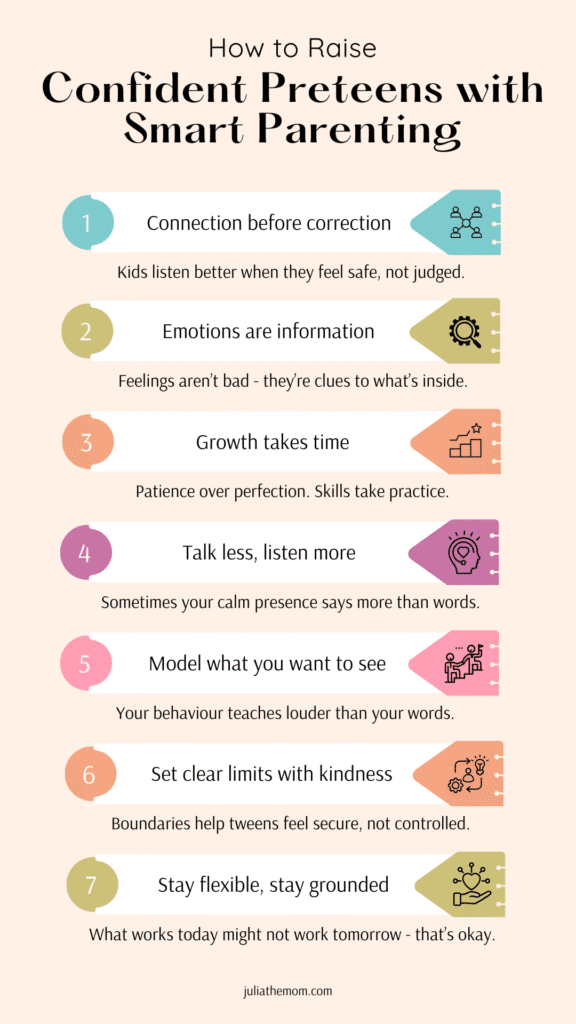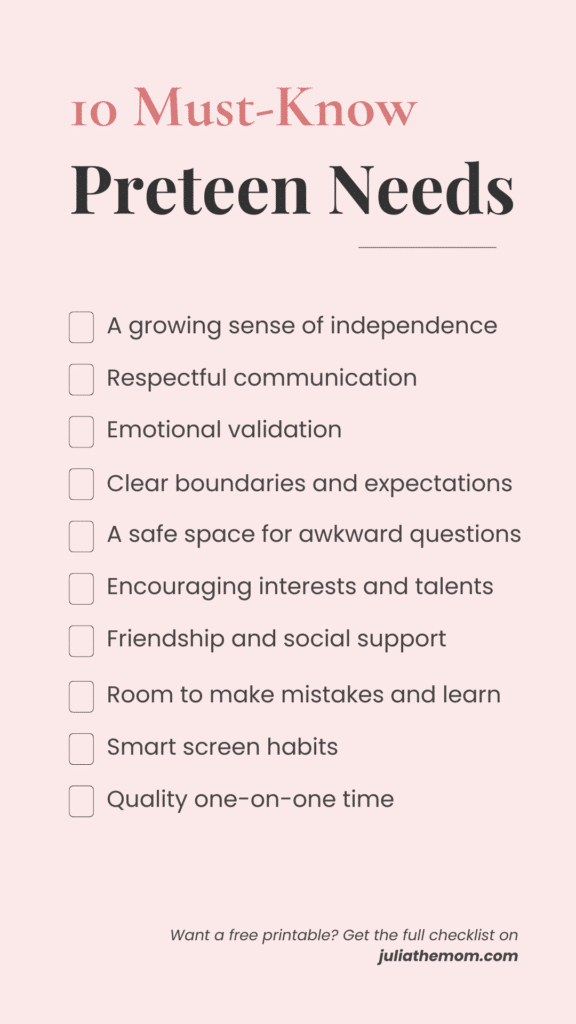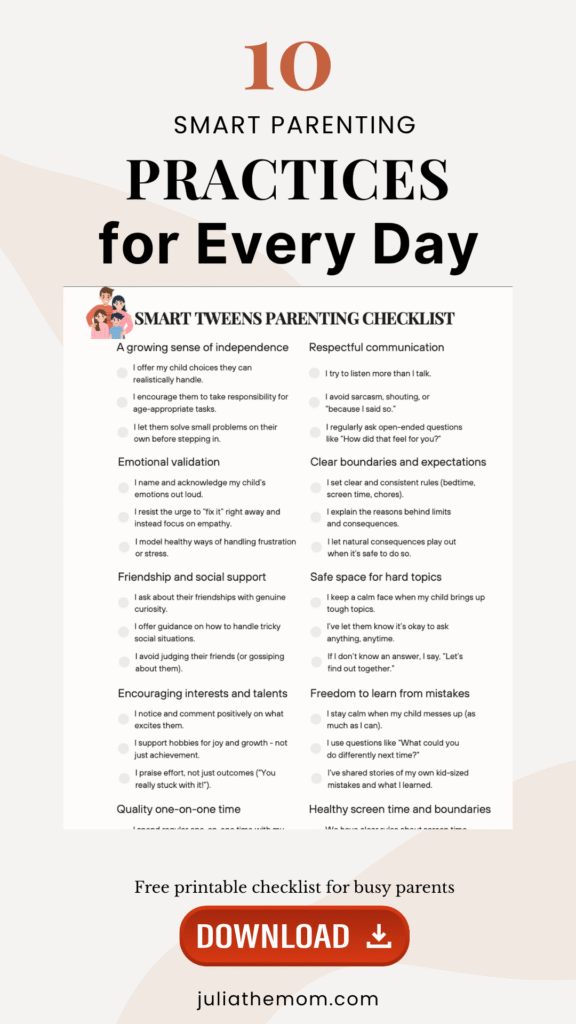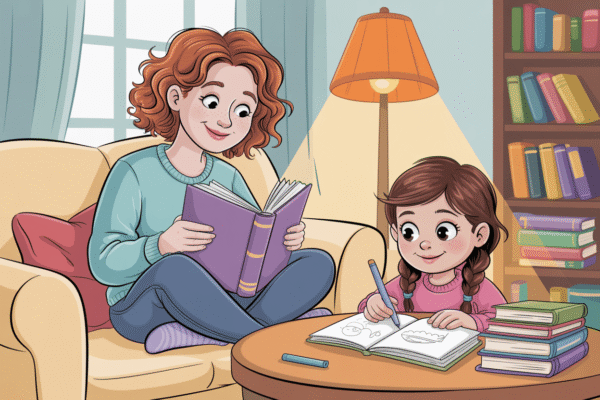Tweens parenting isn’t about having all the answers – it’s about showing up with calm, connection, and curiosity, even when things get messy (and they will). As your child starts to push for more independence, the way you respond matters more than ever.
In this post, we’ll explore the 8 core principles of smart parenting and what preteens really need – with real-life tweens parenting tips you can actually use. And to make it easier, there’s a free one-page checklist at the end to help you stay grounded and intentional, even on busy days.
Who are tweens?
Tweens are kids between the ages of 9 and 12 – they’re not little children anymore, but they’re not quite teenagers yet. It’s a stage full of big feelings, new independence, and important growth – both emotionally and socially. That’s why it’s such a crucial time for connection and support from parents.
Why is parenting tweens so challenging?
Parenting tweens can feel tough because they’re going through major changes – emotionally, socially, and physically. They start to question rules, crave more independence, and care more about friendships and fitting in. At the same time, they still need support, structure, and lots of love from you – even if they don’t always show it.
Table of Contents
This post contains affiliate links, meaning I get a commission if you decide to make a purchase through my links, at no extra cost for you (full Disclaimer & Terms of Use)
8 Core Principles of Smart Parenting
A simple explanation of smart parenting is right at the beginning of the post 10 Smart Parenting Books for Moms: What Works for All Ages, Tweens & Teens, so let’s skip ahead to the key ideas and how to actually use them.
So what does that look like in real life?
Let’s take a closer look at the core ideas behind smart parenting – the values and habits that make the biggest difference, no matter your child’s age or personality.
These guiding principles can help you stay grounded, especially during the emotional ups and downs of the tween years (and beyond).
1. Connection before correction
Children are more likely to listen, cooperate, and learn when they feel safe and emotionally connected. Instead of jumping straight into consequences or lectures, start by acknowledging what they’re feeling. A simple “That was hard, huh?” can go a long way. Connection is not a reward – it’s the foundation for everything that follows.
And one of the best ways to build that connection? Spend meaningful time together doing something fun or unexpected. If you’re curious about what that looks like in real life, check out a few posts from my Smart Parenting series – like Mom and Daughter Time: 8 Cool Ways to Bond via Padel or Mom and Daughter Bonding: 6 Fun Fortnite-Inspired Ideas. Little moments of shared joy can open the door to big conversations — and stronger relationships.
2. Emotions are information
When kids cry, get angry, shut down, or act out, they’re not just “being dramatic” – they’re communicating something they can’t yet express clearly. Emotions are signals, not problems. Smart parenting means staying curious: “What’s really going on underneath this behavior?” Naming and validating emotions helps kids manage them better over time.
If you want to dive deeper into this idea, I highly recommend the book The Whole-Brain Child: 12 Revolutionary Strategies to Nurture Your Child’s Developing Mind by Dr. Daniel J. Siegel and Dr. Tina Payne Bryson. It explains how a child’s brain processes big emotions and offers simple, science-backed strategies to help you respond with calm curiosity instead of frustration. It’s a game-changer for turning emotional outbursts into moments of connection and growth (and it’s one of the top picks in my post 10 Smart Parenting Books for Moms).
3. Growth takes time
It’s easy to expect our kids to “know better” or “act their age” – especially when we’ve told them the same thing ten times already. But emotional skills like self-regulation, empathy, and responsibility don’t develop overnight (or even after a few good talks). They take time, practice, and lots of do-overs.
So the next time your child melts down over something small or forgets their homework again, try taking a deep breath before reacting. When we respond with patience instead of punishment, we create a safe space for them to learn and grow – without the weight of shame. Mistakes aren’t signs of failure. They’re signs that learning is happening.
4. Talk less, listen more
You don’t have to fix everything with a speech (even if you really want to). In fact, when your child is upset, overwhelmed, or shutting down, too many words can actually make things worse. Sometimes, the most helpful thing you can do is just be there – quietly.
Smart parenting in those moments means listening first, validating second, and only then responding – if needed. A calm presence, a hug, or a simple “I’m here” can do more than the best pep talk. Your child doesn’t always need solutions. Sometimes, they just need you.
5. Set clear limits with kindness
Kids don’t need a million rules – but they do need to know what to expect. Structure and clear boundaries help them feel safe, even if they push against them sometimes. It’s not about being strict – it’s about being steady.
Smart parenting means setting limits that are kind but firm. You can say things like, “I’m not okay with that tone, but I’m here when you’re ready to talk.” Or “Screens go off at 8, even if it’s your favorite show.” When boundaries are clear, respectful, and predictable, kids learn to trust them – and trust you.
6. Model what you want to see
You can give the best advice in the world – but if your child sees you snapping, blaming, or shutting down, that’s what they’ll copy. The truth is, our everyday behavior teaches more than any lecture ever could.
Smart parenting isn’t about being perfect. It’s about modeling real-life skills: taking a breath when you’re frustrated, saying “I’m sorry” when you mess up, or showing respect even when you’re tired. When we lead by example – not perfection – we teach our kids how to be emotionally honest humans too.
7. Encourage curiosity and autonomy
Want your child to be more motivated? Let them take the lead sometimes – even if it means things won’t be perfect (or clean). Whether they’re choosing their outfit, planning a snack, or building a cardboard city in the living room, giving them ownership helps them feel capable and confident.
Smart parenting means saying “yes” to curiosity, creativity, and problem-solving – even when it’s a little messy or inconvenient. When kids feel trusted, they’re more likely to trust themselves too.
8. Stay flexible, stay grounded
Some days your child needs a hug. Other days – space. What worked last week might not work today (and that’s normal). There’s no perfect script – just you, doing your best in the moment.
Smart parenting means staying flexible when emotions run high, but keeping your focus on the bigger picture: connection, growth, and respect. Even if the plan falls apart or someone melts down, your calm presence is what truly makes the difference.
What Preteens Really Need – and How Smart Tweens Parenting Supports Them
1. A growing sense of independence
Preteens are starting to say, “I can do it myself!” – and they mean it. This is the time when they want to make their own choices, even if it’s just deciding what snack to eat or how to decorate their room.
💡 Smart tweens parenting response:
Give them meaningful choices within clear limits. Let them help with real tasks like packing their lunch or organizing their homework station. This builds confidence and shows that you trust their ability to make decisions.
✅ Checklist for smart tweens parenting:
🔘 I offer my child choices they can realistically handle (meals, routines, homework time).
🔘I encourage them to take responsibility for age-appropriate tasks.
🔘 I let them solve small problems on their own before stepping in.
2. Respectful communication
At this age, kids are extremely sensitive to tone, body language, and fairness. If they feel dismissed or talked down to, they may shut down or push back hard.
💡 Smart tweens parenting response:
Talk with them, not at them. Use open-ended questions like “What was the best part of your day?” or “How would you like to handle this?” When conflict arises, aim for calm curiosity rather than immediate correction.
✅ Checklist for smart tweens parenting:
🔘 I try to listen more than I talk.
🔘 I avoid sarcasm, shouting, or “because I said so.”
🔘 I regularly ask open-ended questions like “How did that feel for you?”
3. Emotional validation
Preteens can feel overwhelmed by emotions they don’t fully understand – sadness, anxiety, anger, even loneliness. They need help naming these feelings and learning that emotions aren’t “bad,” just messages.
💡 Smart tweens parenting response:
Acknowledge feelings before offering solutions. “It sounds like you were really disappointed when that happened.” Help them connect emotions to actions: “What could you do next time when you feel that way?”
✅ Checklist for smart tweens parenting:
🔘 I name and acknowledge my child’s emotions out loud.
🔘 I resist the urge to “fix it” right away and instead focus on empathy.
🔘 I model healthy ways of handling frustration or stress.
4. Clear boundaries and expectations
While they want more freedom, preteens still crave the security of knowing what’s okay and what’s not. Inconsistent rules or unclear consequences can leave them feeling anxious or out of control.
💡 Smart tweens parenting response:
Be consistent and fair. Explain the why behind rules – kids this age are ready to understand reasoning. Let consequences (natural or logical) do the teaching when possible: “If you leave your soccer shoes outside and it rains, they’ll get ruined – that’s not a punishment, it’s just what happens.”
✅ Checklist for smart tweens parenting:
🔘 I set clear and consistent rules (bedtime, screen time, chores).
🔘 I explain the reasons behind limits and consequences.
🔘 I let natural consequences play out when it’s safe to do so.
5. Friendship and social support
Friendships become more important than ever – and also more complicated. Preteens may face exclusion, peer pressure, or confusion about loyalty. They might not always share what’s happening.
💡 Smart tweens parenting response:
Create a non-judgmental space where they can talk. Ask about the feelings behind social struggles, not just the facts. Teach skills like how to set boundaries, say no kindly, or stand up for others. Let them know it’s okay to outgrow friendships that don’t feel good.
✅ Checklist for smart tweens parenting:
🔘 I ask about their friendships with genuine curiosity.
🔘 I offer guidance on how to handle tricky social situations.
🔘 I avoid judging their friends (or gossiping about them).
6. A safe space for awkward or big questions
Questions about puberty, identity, relationships, and the world around them will naturally arise – sometimes suddenly, sometimes hesitantly. They’re watching how you react to see if it’s safe to ask more.
💡 Smart tweens parenting response:
Stay calm and open. If you’re surprised, say something like: “That’s a great question – let me think for a second so I can answer it well.” You don’t have to have all the answers, but you do need to be available, respectful, and honest.
✅ Checklist for smart tweens parenting:
🔘I keep a calm face when my child brings up tough topics.
🔘I’ve let them know it’s okay to ask anything, anytime.
🔘 If I don’t know an answer, I say, “Let’s find out together.”
7. Encouraging interests and talents
At this age, kids are forming opinions about what they’re “good at” – or not. Positive reinforcement helps build a strong sense of identity. But too much pressure can have the opposite effect.
💡 Smart tweens parenting response:
Celebrate effort, not just results. Notice small wins: “I saw how focused you were when building that model – you didn’t give up.” Avoid turning every interest into a performance or competition. Let them explore just for the joy of it.
✅ Checklist for smart tweens parenting:
🔘 I notice and comment positively on what excites them.
🔘 I support hobbies for joy and growth – not just achievement.
🔘I praise effort, not just outcomes (“You really stuck with it!”).
8. Room to make mistakes and learn from them
Preteens are testing boundaries and making more decisions – which means they’ll get things wrong. This is a healthy and necessary part of growing up.
💡 Smart tweens parenting response:
Instead of rushing to fix things or lecture, guide them through reflection. Ask, “What would you do differently next time?” Share (lighthearted) stories from your own preteen years – this builds connection and normalizes the learning process.
✅ Checklist for smart tweens parenting:
🔘 I stay calm when my child messes up (as much as I can).
🔘 I use questions like “What could you do differently next time?”
🔘 I’ve shared stories of my own kid-sized mistakes and what I learned.
9. Healthy screen habits and tech boundaries
Technology is part of their everyday world, but preteens still need help using it wisely. Without structure, screen time can easily affect sleep, focus, or emotional well-being.
💡 Smart tweens parenting response:
Co-create tech rules together: “How much screen time feels right to you on a school night?” Encourage digital balance – for every hour of gaming, maybe an hour of something creative or active. Most importantly, keep communication open about what they see or experience online.
✅ Checklist for smart tweens parenting:
🔘 We have clear rules about screen time – and they know why.
🔘 I sometimes join them in digital play (games, shows, music).
🔘 I’ve talked with them about online safety, ads, and how they feel after screen time.
10. Quality one-on-one time
Even if they roll their eyes or act like they’re too old, preteens deeply value connection with their parents. These small moments of attention are protective – they build resilience, trust, and self-worth.
💡 Smart tweens parenting response:
Make time for low-pressure, distraction-free connection. It could be chatting over a snack, walking the dog, doing a puzzle, or driving to practice without the radio. The message is: “You matter to me. I like spending time with you.”
✅ Checklist for smart tweens parenting:
🔘 I spend regular one-on-one time with my child without screens.
🔘 I show interest in their world – even if it’s not my thing.
🔘 I make time for moments of warmth (a hug, a smile, a short chat) every day.
🎁 Free Download: One-Page Smart Tweens Parenting Checklist
Want a quick, clear reminder of what really matters when raising a preteen?
I’ve turned the full list “What Preteens Really Need – and How Smart Tweens Parenting Supports Them” into a simple, printable 1-page checklist – so you can stay grounded and intentional, even on busy days.
📝 What’s inside:
✅ 10 core emotional and developmental needs of preteens
✅ Real-life tweens parenting responses to each need
✅ A 3-point self-checklist for each area – quick, honest, and actionable
📌 Use it to:
– Reflect on your tweens parenting style with curiosity, not guilt
– Spark conversations with your partner, co-parent, or teacher
– Keep it on your fridge, planner, or inside your parenting journal
– Remind yourself: you don’t have to be perfect, just present
👉 Click below to download your free one-page guide and start using smart parenting principles with more ease and clarity today.
Instead of Conclusion
There’s no perfect way to parent – especially during the rollercoaster years of tweens. But with a little intention and a lot of compassion, tweens parenting can become less about daily battles and more about building trust, resilience, and real connection.
Use these core ideas, reflect with the checklist, and come back to them whenever things feel wobbly. Smart tweens parenting isn’t about doing more – it’s about showing up with heart, even on the hard days. You’ve got this.
✨ Want more support for the preteen years?
– Read Increasing Intrinsic Motivation: 10 Simple Steps – a gentle guide to help your child stay curious, engaged, and self-driven.
– Or check out 50 Uplifting & Positive Quotes for Teens and Pre-Teens, 100 Back to School Quotes for Tweens to Use All Year Long, and 60 Inspiring Teenage Daughter Quotes Moms Can Use Daily– perfect for lunch notes, bedroom walls, or a quick boost of encouragement.
– And don’t miss 10 Smart Parenting Books for Moms: What Works for All Ages, Tweens & Teens – packed with practical, heart-centered reads for every stage.
Parenting Without Yelling: 33 Easy Smart Parenting Hacks
📌 Love ideas like these?
Follow me on Pinterest Julia-the-Mom for more real-life parenting tips, smart tools, and gentle encouragement – straight from one busy mom to another.






